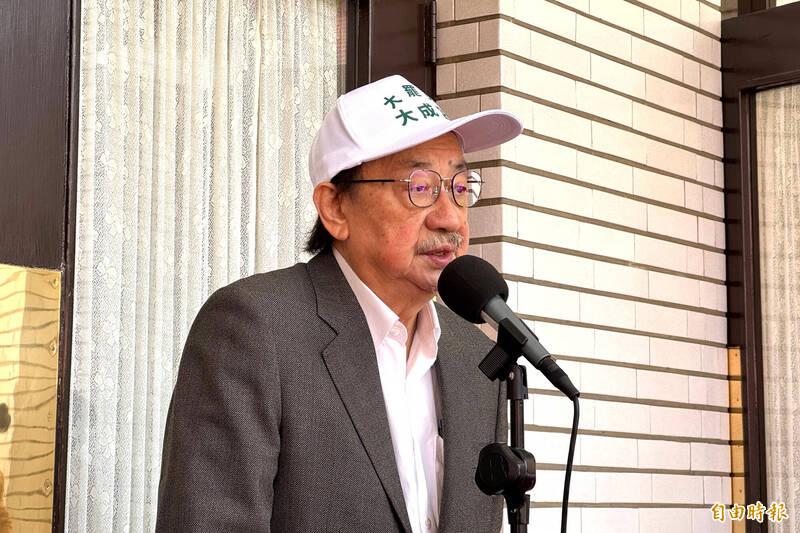The ruling Democratic Progressive Party (DPP) said it respects the president’s authority while the opposition parties questioned his choices after the Presidential Office announced seven new judicial nominees for the Constitutional Court today.
Taiwan People’s Party (TPP) Chairman Huang Kuo-chang accused the DPP of returning to the era when “justices and prosecutors were one family” by nominating a prosecutor to be the Judicial Yuan president.
“Not that they are bad, but I was thinking about Liu Ching-yi (劉靜怡),” he said, referring to the only nominee the TPP approved during a vote held in the legislature last year when all seven judicial nominees were rejected.

Photo: Chen Cheng-yu, Taipei Times
He questioned whether the nominees would owe “loyalty” to the DPP, unlike Liu, and whether they would be rejected if they criticize the DPP.
The Chinese Nationalist Party (KMT) would responsibly review the nominees from different perspectives to exercise its constitutional obligations, it said in a statement released today.
As a gatekeeper, the KMT would select impartial and appropriate nominees to be the grand justices to allow the Constitutional Court to resume its normal operations, it said.
The KMT added that the judicial nominees should state clearly whether they support the death penalty and favor imposing heavier penalties on those who are convicted of abusing children.
It would be unfair to criticize the nominees when the relevant documents have not even been sent to the legislature, DPP caucus chief executive Rosalia Wu (吳思瑤) said while commenting on the opposition lawmakers’ response which she described as opposing for the sake of opposition.
The DPP respects the president’s authority, she said, adding that it is the legislature’s duty to scrutinize the nominees.
DPP caucus whip Ker Chien-ming (柯建銘) said while he agreed that it is inappropriate to nominate a prosecutor to be the Judicial Yuan president, he believed Lai had been prudent in nominating these candidates.
It is meaningless to nominate grand justices at the moment because the opposition parties have amended the Constitutional Court Procedure Act (憲法訴訟法), requiring at least 10 justices on the court and at least nine justices to back any unconstitutional ruling, Ker said.
This is totally unconstitutional and the DPP has requested an injunction and constitutional interpretation of the amendments, he said.
In related news, the Central Election Commission today said it is to hold a hearing to clarify relevant arguments after convening a meeting to discuss a proposal about holding a referendum on amendments to Article 30 of the Constitutional Court Procedure Act.
The question of the proposed referendum is: “Do you agree to abolish amendments to Article 30 of the Constitutional Court Procedure Act which would require at least 10 justices on the court and at least nine justices to back any unconstitutional ruling passed on Dec. 20 last year?”
According to the petition, the proposal was put forward by a volunteer group which said it could not turn a blind eye to the Constitution Court being paralyzed and the principle of separation of powers being violated.
The group made the proposal based on the belief in a democratic constitutional order in a bid to safeguard the constitution and human rights in the nation, it said.
Additional reporting by Shih Hsiao-kuang

The Ministry of Economic Affairs has fined Taobao NT$1.2 million (US$36,912) for advertisements that exceed its approved business scope, requiring the Chinese e-commerce platform to make corrections in the first half of this year or its license may be revoked. Lawmakers have called for stricter enforcement of Chinese e-commerce platforms and measures to prevent China from laundering its goods through Taiwan in response to US President Donald Trump’s heavy tariffs on China. The Legislative Yuan’s Finance Committee met today to discuss policies to prevent China from dumping goods in Taiwan, inviting government agencies to report. Democratic Progressive Party Legislator Kuo Kuo-wen (郭國文) said

The Ministry of Economic Affairs has fined Taobao NT$1.2 million (US$36,900) for advertisements that exceeded its approved business scope and ordered the Chinese e-commerce platform to make corrections in the first half of this year or its license would be revoked. Lawmakers have called for stricter supervision of Chinese e-commerce platforms and more stringent measures to prevent China from laundering its goods through Taiwan as US President Donald Trump’s administration cracks down on origin laundering. The legislature’s Finance Committee yesterday met to discuss policies to prevent China from dumping goods in Taiwan, inviting government agencies to report on the matter. Democratic Progressive Party

Taiwan and its Pacific ally Tuvalu on Tuesday signed two accords aimed at facilitating bilateral cooperation on labor affairs, according to Taiwan’s Ministry of Foreign Affairs (MOFA). The governments inked two agreements in Taipei, witnessed by Foreign Minister Lin Chia-lung (林佳龍) and visiting Deputy Tuvaluan Prime Minister Panapasi Nelesone, MOFA said in a news release. According to MOFA, the agreements will facilitate cooperation on labor issues and allow the two sides to mutually recognize seafarers’ certificates and related training. Taiwan would also continue to collaborate with Tuvalu across various fields to promote economic prosperity as well as the well-being of their

Sung Chien-liang (宋建樑), who led efforts to recall Democratic Progressive Party (DPP) Legislator Lee Kun-cheng (李坤城), was released on bail of NT$80,000 today amid outcry over his decision to wear a Nazi armband to questioning the night before. Sung arrived at the New Taipei District Prosecutors’ Office for questioning in a recall petition forgery case last night wearing a red armband bearing a swastika, carrying a copy of Adolf Hitler’s Mein Kampf and giving a Nazi salute. Sung left the building at 1:15am without the armband and covering the book with his coat. Lee said today that this is a serious